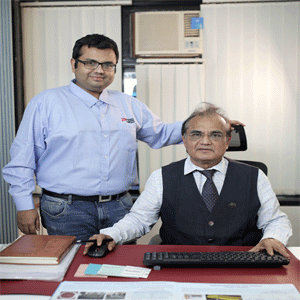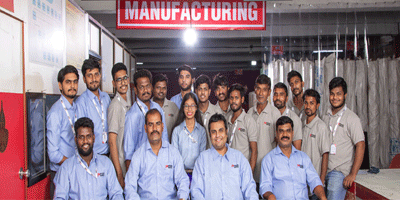
The increasing power generation in the country to satisfy its insatiable demand is driving the Indian industrial gaskets industry. The excellent business conditions in the Indian manufacturing sector are driving the country's market growth. Hon PM’s Make-in-India initiative is assisting India in becoming a centre for hi-tech manufacturing, as numerous global behemoths have either established or are in the process of establishing manufacturing operations in India, aided by a young and eager population and rising purchasing power. Furthermore, the Government of India is undertaking several steps to foster a favourable environment for the development of the country's manufacturing sector, hence increasing the overall industrial gaskets market in India.
PGE Industries or Pilot Gaskets is one such significant participant in this space that has been in this sector for over six decades. PGE Industries is certified by the ISO quality management system from 9001, 14001, and 45001. It is registered with Engineers India as well as DGQA (Directorate General of Quality Assurance), a Defence critical manufacturer as well as other large quality EPCs including Tata Power, L&T, Thyssenkrupp, and more. PGE Industries is one of the few firms in India that has a clean room production facility, which is required for some critical oxygen equipment and pharmaceuticals grade.
It primarily engages in technical sales, collaborating closely with OEMs during the design and development stages. The company is a leading component designer, heavily involved in the design and development of engineering equipment. It also received accolades from the Ministry of Petroleum & Ministry of Defence Production thanking it for its assistance in critical projects. PGE representatives are also on the board of the Bureau of Indian Standards and working diligently towards increasing the awareness of what constitutes Safe Seal.
A Notch Above All
PGE Industries maintains internal quality control and does extensive raw material testing in-house. It includes technical types, which many laboratories including ELCA Labs, NABL, and IRMRA, where it does polymer, non-metallic, and metallic product testing. The firm utilizes state-of-the-art high-precision laser machines for metal manufacturing, and colour coding project process lines and for non-metallic, it has automated winding machines, and dieless cutting machines and relies heavily on the reduction of wastage and high-efficiency production.
PGE Industries' key strength is its team and its project R&D methodology. The firm has a skilled team of professionals with extensive expertise and knowledge in a variety of sectors. When a
customer approaches the company with a question and their specific requirements, PGE recommends best practices and changes and designs an entirely new product for them based on their expectations and service life.
“It is a very unique approach where it's not just about giving what a customer wants, but working in hand with their actual expectations on what they define as reliability and what they believe life should be of the gasket. So once the customer works with us and gets the experience, it has a long bonding of 40-50 years ahead, placing PGE as their preferred partner”, says Darshan A Parek, Technical Director.
The Journey
PGE Industries or Pilot Gaskets and Engineers started off as a family business with its roots as a trade house in Mumbai propelled by Late Jagjivandas V. Parekh. It has since developed not only in Mumbai but all across India. Amul J. Parekh took over the reins from there and grew Pilot Gaskets into a reliable partner for many companies from Assam to Kashmir; from Tamil Nadu to Rajasthan. Darshan Parekh completed his Bachelor of Engineering in Mumbai and MBA in Australia before joining the Gasket business in 2011.

"We went through a path where we refused to offer our customers any material that would be harmful to their employees. There was high usage of carcinogenic materials made from Carcinogenic Asbestos Fibre (CAF) and we actually went about educating, training, and changing our clients to safer materials. We were one of the first Indian industrial gasket producers to abandon asbestos entirely.
We lost almost 40 percent of our sales but we knew we were on the righteous path toward a responsible and sustainable India. But, six years later, we can see that this was a wise decision. All of our competitors are now following in our footsteps. So we're quite delighted to be a part of a journey that increased overall safety in an industrial workplace and helped create a better environment for our children", says Darshan A. Parekh, Technical Director.
PGE Industries gradually grew over the years, and in 2014 it signed a technology partnership with Donit Tesnit Europe. It immediately began to grow and went into production with the addition of state-of-the-art materials not yet available in India. PGE was able to change materials, and offer new designs from a variety of different materials, and they understood the basics of what constitutes a good seal. PGE was no longer giving the customer what they want but working hand in hand with improving Sealing technology.
It is not about giving a customer the cheapest gasket but working hand in hand with what they believe is reliability; what they believe should be the life of a gasket & exceeding these expectations
PGE Industries has identified areas where it believes it can bring value, such as fugitive emissions, and leaks that usually occur in factories, chemical industries, and refineries. And it believes that stopping these leaks not only improves the efficiency of a product like a valve or a pump but also helps in reducing a factory’s carbon footprint, reducing carbon tax, and increasing production due to less leakage.
As a result, the company is focusing on these leak rates, which can only be determined with specialized sensitive sensors. PGE Industries is currently attempting to achieve substantially lower leakage rates with the use of these sensors and conducting various tests in the 3D Printing of Seals. As a result, the firm's purpose is no longer to look at a leak as a droplet leak, a water leak, or a bubble test; instead, the firm has gone into far higher gas tightness levels. As hydrogen becomes the energy source of the future, gas tightness and the quality of development and testing the firm performs will be in high demand in the future.
We use cookies to ensure you get the best experience on our website. Read more...